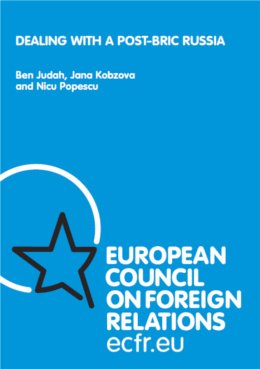Dealing with a post-BRIC Russia
Learning to deal with a changing Russia under a familiar leader
The overall outcome of Sunday’s elections – with only tame parties standing in opposition to Putin – is not in doubt, but the specific results may signal that the Putin system is losing its legitimacy, just as he readies himself to retake the presidency (possibly until 2024). But Putin would not be returning to the same Russia as when he last held the presidency: buffeted by economic turbulence and fearful of stagnation, Russia is now post-BRIC. It no longer believes it shares the same power-trajectory as Brazil, India and China; instead, it thinks it is in relative decline with the West.
A new ECFR report, ‘Dealing with a post-BRIC Russia’ by Ben Judah, Jana Kobzova and Nicu Popescu, looks at the domestic and foreign policy constraints on a post-BRIC Russia that will shape Putin’s next presidency. It analyses how Europe should rethink its relationship with Moscow. The authors argue that:
-
The economic crisis has exposed a governance crisis inside Russia: even Putin now admits that as much as 80% of Kremlin orders have been ignored in the regions. Instead of modernising, Russia in 2010 was as corrupt as Papua New Guinea, had the property rights of Kenya and was as competitive as Sri Lanka.
-
The crisis has also prompted a foreign policy rethink inside Russia: post-BRIC Russia is now aiming for a low cost sphere of influence in the post-Soviet space and is increasingly nervous about China.
-
The EU lacks a strategy for this new Russia: Europeans have gone from thinking of Russia as a “big Poland”, that it can encourage towards liberal democracy, to a “small China”, which it can do business with but little else. But preoccupied by the economic crisis, European Union is missing an opportunity to re-engage Russia and turn it into a partner on issues of mutual concern.
- Europe’s strategy should be to re-engage Russia whilst constraining Putin’s room for manoeuvre: for instance it should move as far as possible towards a visa-free regime, introducing a simplified electronic visa system. At the same time it should be consistent on human rights abuses by the authorities and address the energy vulnerability of neighbours such as Ukraine or Moldova vis-à-vis Moscow.
Contacts: [email protected] [email protected] [email protected]
[email protected] 020 72 27 6880
A Spanish translation of the essay has been published by Journal Politica Exterior
Key facts:
- Opinion polls suggest a decline in Putin’s popularity from 83% in October 2008 to 61% in November 2011.
- 82% of Russians don’t believe they have any influence over the country’s political life and 55% refuse to play any part in it (November 2011).
- suffered the worst recession in the G20 in 2009. Growth is now back at a projected 4% for 2011 (down from 8.5% in 2007), which is enough to muddle through but not enough to keep pace with dynamism of China or India
- Seven political parties are contesting the elections with the pro-Kremlin United Russia the likely winner. One of the key opposition parties – People’s Freedom Party (PARNAS) – was denied registration earlier this year.
The European Council on Foreign Relations does not take collective positions. ECFR publications only represent the views of their individual authors.



